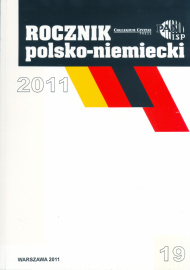Rola Unii Europejskiej w sporze o gazociąg północny. Komentarze w prasie polskiej i niemieckiej
The European Union’s role in the Baltic Pipeline controversy. Comments in the Polish and German press
Author(s): Adam JaroszSubject(s): Politics / Political Sciences
Published by: Instytut Studiów Politycznych PAN
Summary/Abstract: The Baltic Pipeline turned out to be a controversial undertaking from the start of its implementation. The main role in this was played by the media, which bestowed publicity on the problem and, in particular, on the apprehensions provoked by this project. A very important role in this matter was performed by the European Union. It happened thus because practically all the states involved in the controversy were members and, as such, referred to its institutions in a empting to block the project. The EU’s role also had its second layer. Throughout, the parties involved in building the pipeline emphasised the European character of the project, which was to serve all the member states. This article aims at describing the debate in the press which was held in Poland and in Germany and at presenting what was written about the role of the European Union in the dispute around the Baltic Pipeline and in what context. The main issue described in the press turned out to be the European Energy Charter, which Russia was unwilling to ratify. This document was to provide the European energy companies with access to the Russian gas market, which was regarded, both in Poland and in Germany, as one of the measures helping to improve Europe’s energy security. Another issue under consideration turned out to be the unity of the EU member countries as far as energy is concerned; something which was not easy to obtain. The Baltic Pipeline as a project was not interpreted uniformly. The Polish press perceived in the EU institutions an opportunity to torpedo it. The German media presented the pipeline as part of a European system, capable of improving the energy security for the entire continent. An idea of a common energy policy also emerged in the EU; it was not, however, faced with unity among its members. The Polish press referred to a Three Musketeers’ one for all, all for one principle, which was to be implemented by the UE’ states’ supplying raw materials from their reserve stocks in a case of the interruption of supplies to one of the members. The German media, however, were cool toward the idea. The Polish government went a step further in this debate and suggested the formation of an energy NATO, to include the US into their co-operation as well. This suggestion was not appreciated, however, among German politicians and the media. The latter promoted a concept of energy co-operation along the OSCE lines and deemed a NATO-like approach as too confrontational toward Russia.
Journal: Rocznik Polsko-Niemiecki / Deutsch-Polnisches Jahrbuch
- Issue Year: 2011
- Issue No: 19
- Page Range: 146-167
- Page Count: 22
- Language: Polish

